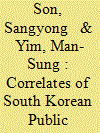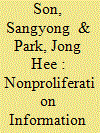| Srl | Item |
| 1 |
ID:
181884


|
|
|
|
|
| Summary/Abstract |
What explains South Korean public opinion on nuclear weapons development? Despite the US security commitment, most South Koreans consistently support independent nuclear weapons development. To solve this puzzle, we investigate the mechanisms of security threat and security commitment under which individuals develop their opinion on nuclear proliferation. An original survey of 1,988 South Korean adults shows empirically supported correlates of South Korean public opinion on nuclear proliferation. Public support for proliferation is largely shaped by external security threats: nuclear threats from North Korea and China, but also the latent nuclear superiority of Japan. Public opposition to proliferation is fostered by the perceived credibility of the US security commitment, but not by its perceived effectiveness. The results provide insights into South Korean public opinion on nuclear proliferation and can inform the design of a nonproliferation policy tailored to South Korea.
|
|
|
|
|
|
|
|
|
|
|
|
|
|
|
|
| 2 |
ID:
193104


|
|
|
|
|
| Summary/Abstract |
What explains the foreign policy gap between elites and the general public on nuclear proliferation? We investigate specific contexts in which experts’ nonproliferation information changes public attitudes toward nuclear weapons development using a novel attitude change experiment. By randomly assigning seven categories of nonproliferation information to pro-armament survey participants, we examine how different types of nonproliferation information affect pro-armament respondents’ opinions and behavioral choices. The results of our experiment demonstrate the enlightening effect of economic sanctions information. After learning about the economic costs and consequences of nuclear weapons development, pro-armament respondents substantially changed their opinion as well as behaviors toward nuclear proliferation. In comparison to economic sanctions information, other types of nonproliferation information (e.g. conditional military punishment, normative sanctions, nuclear technology sanctions, elite or public opposition to proliferation) have limited effects on pro-armament subjects’ attitude changes. These findings are the first to identify the relative explanatory powers of previous explanations for nuclear nonproliferation at the individual level.
|
|
|
|
|
|
|
|
|
|
|
|
|
|
|
|